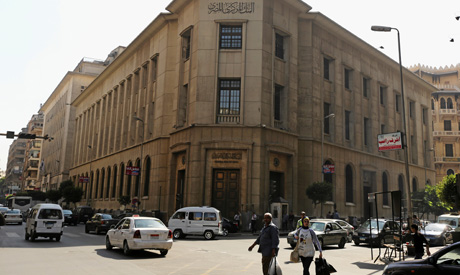
Central Bank of Egypt’s headquarters is seen in downtown Cairo, Egypt (photo: Reuters)
The Monetary Policy Committee of the Central Bank of Egypt (CBE) cut interest rates by one per cent (100 basis points) on 26 September. The new cuts included decreasing overnight interest rates to 13.25 per cent, overnight lending rates to 14.25 per cent, and the rate on main operations to 13.75 per cent.
This is the third cut in interest rates this year, and it has driven many to wonder how best to invest their money.
“Depositing in the banks is still profitable. Even after the recent cuts, interest rates are still higher than inflation,” said Alia Al-Mahdi, a professor of economics at Cairo University.
Annual inflation rates dropped in August to reach 6.7 per cent, compared to 13.6 per cent in August 2018.
The CBE explained that the latest decision to lower interest rates was in line with achieving the targeted inflation rate of nine per cent, plus or minus three per cent, during the fourth quarter of 2020 and stabilising prices in the medium term.
“Annual headline and core inflation continued to decline to record 7.5 per cent and 4.9 per cent in August 2019, respectively, the lowest rates in more than six years. The decline continued to be supported by the containment of inflationary pressures as well as favourable base effects, as monthly inflation recorded 0.7 per cent in August 2019 compared to 1.8 per cent in August 2018,” the CBE said.
Following the CBE decision, the state-owned National Bank of Egypt and Banque Misr fixed interest rates on investment certificates and long-term savings deposits. The National Bank of Egypt, Banque Misr and Banque du Caire also lowered interest rates on loans and cut interest rates on saving accounts by between 0.5 per cent and one per cent based on value and maturity, with most other banks following suit.
Al-Mahdi suggested that people not looking to cash in on monthly interest or a quick return could invest in gold, a long-term investment that will bring in revenue in two or more years’ time.
She also suggested investing in real estate for larger sums of money. However, she believes that this is not the safest bet at the moment, since the real-estate market is sluggish, and investors may find it hard to liquidate their assets should they need to do so.
Recent CBE statistics show a rise in the value of deposits by the household sector in the local currency during the first half of 2019.
Overall deposits in Egyptian banks reached LE4.2 trillion by the end of June, according to the monthly bulletin of the CBE. This represents a 12 per cent increase year-on-year and a whopping 88 per cent jump since June 2016.
Simultaneous with the increase in household deposits in the local currency in the first half of 2019 was the appreciation of the pound against the dollar, with the latter losing 6.7 per cent of its value, or 121 piastres, against the pound.
Many people are still not familiar with investment, choosing instead to deposit their money in the banks to benefit from high interest rates or buy into the real-estate market, said Mona Mustafa, an economic analyst with Arabeya Online, an Egyptian online brokerage company.
However, like Al-Mahdi, Mustafa does not believe investing in real estate now is ideal due to the increase in supply manifested in the promotional offers made by real-estate companies to attract new customers. In addition, the resale market is nearing a halt, she said.
Mustafa also believes that not many people will be inclined to invest their money in gold.
With the fading allure of investing in real estate and gold, Mustafa suggested that investment funds should be created to attract the savings of small investors who are wary of taking risks.
These funds would ideally offer a slightly higher revenue than that offered by the banks and their funds could be invested in the Egyptian economy.
*A version of this article appears in print in the 10 October, 2019 edition of Al-Ahram Weekly.
Short link: